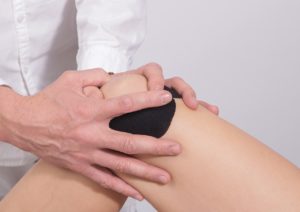Knee surgery is one of the most common bone-related surgical procedures in the United States. As a result, MOSS has seen hundreds of patients looking to prevent the need for surgery, prepare themselves for surgery, or recover from surgery.
Many of these patients come to me confused as to why they are still dealing with knee pain they hoped would be relieved by surgery. Or, patients don’t understand why they should see me here at MOSS before and after they get surgery.
Our specialists feel so much empathy for these patients. It’s easy to empathize: these people are in pain and discomfort, discouraged with their knee pain treatments and with the results of their surgery.
The fact of the matter is that both recovery and prevention take long-term dedication and hard work from both the patient and their team of medical professionals. Patience and humility are two virtues that must be practiced throughout your treatment, surgery, and post-op care in order to get the best and most long-lasting results.
In this post, we’re going to go over essential steps you should take on your journey to a healthy recovery. We’re also going over common things that people skip or ignore… that are crucial to pay attention to.
You’ve been in pain long enough. Let’s get started.
Common Knee Surgery Recovery Setbacks
Setbacks and mistakes can be some of the biggest obstacles you face on a healing journey. Here are some common setbacks we see at MOSS with knee pain injuries & surgery recovery:
Leaving Physical Therapy Too Soon
We understand that no matter how great MOSS is, no matter how much you love your therapist, and no matter how much better you feel after, you don’t really want to be in a medical office. You want your pain gone and your life back!
In order to have a successful recovery after knee surgery, it’s important to follow through on your entire rehabilitation plan. Whether that’s for a few months, half a year, or longer, it’s important to follow through 100 percent.
This is why we utilize the 5 Phases of Healing here at MOSS:
- Minimize Pain and Inflammation
- Restore Mobility, Flexibility, and Strength
- Return to Normal Function and Activity
- Maintenance and Injury Prevention
- Performance Enhancement
Typically, patients think that once they have completed phase one (minimize pain and inflammation) that they are completely healed and don’t need to continue with therapy. Nothing could be further from the truth. In fact, it’s after phase one that the true recovery takes place.
As we move into phases 2-4, we begin to work on improving mobility and strength so you’re able to perform the daily task and hobbies that you want to do. This could be walking with your spouse, playing with your grandkids, gardening… the list goes on. This is different and specific for each patient.
These later phases also help to prevent your issue from returning to give you long-term results.
Knee injuries are complex and can take quite a while to fully heal. In fact, you could be completely pain- and discomfort-free… but your injury might not be completely healed yet. That’s why it’s so crucial to continue with your therapeutic plan even though we all know you just want to be healed and done with it.
Completing the entire treatment plan outlined for your recovery post-op is essential if you want to make a full and complete recovery with long-term results. This is especially true with knee surgery as the surgery itself can irritate your knee and can be considered a separate “injury” than the one that drove you to operative treatment.
Lack of Patience
Perhaps more than other areas of the body, people view knee surgery as an instant cure to their issue. They picture themselves getting surgery and be back to their old selves within weeks or a couple of months.
While that would be great, it’s not the reality. Our knees bear literally all of our weight, so healing the area, especially after an invasive operation, can be lengthy and slow-going.
Smaller surgeries can be looking at a 3 to 6 month recovery period, while larger surgical procedures could need 9 to 12+ months for recovery.
Yes, you read those numbers correctly. That being said, attending your therapy appointments regularly, following treatment & exercise protocols, and following knee injury prevention tips (that we’ll go over later in this article) can help your recovery move forward in a timely manner.
Not Following Medical Instructions
You should follow all medical instructions given to you. Your team of medical professionals are experts at what they do: listen to them!
This means more than following through on your physical therapy.
It means taking your pain medications as prescribed. It means icing, using walkers, using canes, resting, etc.
We’ve seen many patients stall their recovery because they feel they “don’t need” the pain medications. Just because you can “handle” the pain doesn’t mean you don’t need medication.
Meds can help make your therapy sessions easier to help you make more progress. They can make it easier to get up and move around post-op, which is important for avoiding complications like blood clots or loss of muscle tone.
The same goes for mobility aids. Avoiding using a walker because you don’t want to “look old” isn’t a valid reason. Prepare yourself to start using a walker, crutches, then a cane as you heal.
Bottom line: trust your doctors & therapist! They know what they’re talking about.
RICE & Mobility Aids
RICE stands for Rest, Ice, Compression, and Elevation. The RICE method is useful post-injury treatment (remember when you’d follow RICE after twisting your ankle playing kickball in school?) and is very helpful for knee injuries.
Ice, compression, and elevation help to reduce inflammation & swelling and relieve pain, all of which are helpful for recovery post-surgery or injury.
Resting, while seemingly obvious, isn’t always obvious. Like we mentioned earlier, lack of pain doesn’t necessarily mean that you’re healed enough. So, follow your “rest” instructions given to you by your therapist… not based on how your knee is feeling currently.
That brings us back to the mobility aids discussion. If you’re told to keep off the knee for a certain amount of time, that doesn’t mean you have to sit in bed! Walkers, canes, crutches, and even wheelchairs should be used as directed to keep weight off your knee and help your body heal.
Is your knee pain unavoidable? Knee surgery recovery sound daunting?
Sign up for our FREE August 8 workshop that addresses common questions — and answers — about knee pain.
Focus on Prevention
Wouldn’t it be great if instead of having to get surgery in the first place that you could prevent pain and injury? This isn’t a pipe dream. Taking care of your knees and your body in specific ways can prevent your need for surgery.
If you could potentially avoid a surgical procedure by following some preventative techniques, why not try?
Prevention can also make your recovery post-op easier and smoother. Let’s look at how:
Lifestyle Choices
Knee pain is directly related to a number of lifestyle factors in our lives.
One of the major ones is obesity and nutrition. Obesity is one of the most prevalent knee pain causes and studies have linked extra weight to an increased risk of knee pain & injury.
Losing weight along with getting good & healthy nutrition are great ways to support knee health and reduce your risk of injury. Less weight means less pressure on your knees, which can relieve pain for many people. So much so that some find they don’t need to pursue operative treatments.
Other lifestyle choices that can help with knee surgery recovery and knee injury prevention include:
- Getting adequate rest & sleep
- Proper diet with healthy and nutritious meals
- Staying hydrated
- Exercise
- Proper supportive footwear
Avoid Accidents
Of course, it can be impossible to predict accidents, so take this advice with a grain of salt. However, there are ways that you can restructure your life in order to avoid injury, especially if you know that you’re prone to knee issues and injuries.
For example, if you know that your knee has been feeling a bit uncomfortable, now wouldn’t be the time to volunteer as the catcher for the company softball game.
We recommend during recovery and knee pain treatment that you avoid activities that could cause injury or re-injury. This could include certain sports, long walks, hiking, large staircases, and anything else that causes pain and discomfort in the knee.
Also, be cautious while using mobility equipment. Going up and down stairs on crutches is tough and, at worst, dangerous. Don’t be afraid to look for an elevator, for example.
Stay Active
Slacking on recovery exercises or failing to follow your treatment plan will only make a full recovery harder, and potentially impossible. At worst, failing to follow through on recovery could lead to another injury or setbacks in your healing.
While rest is important for knee injuries, you also need to make sure you’re working on staying active, moving your muscles, and training your knee to maintain mobility, flexibility, and strength.
Keeping activity levels up strengthens your entire body, which helps to speed up recovery.
Prevention Helps to Prepare Your Body for Surgery
I love to cycle. I regularly participate in cycling competitions and long-distance races that can climb into the hundreds of miles.
When I do these races, I don’t jump in without any practice or training time. I’ll spend weeks or months preparing for a race with practice rides, exercises to strengthen muscles in my legs & knees, exercises to strengthen supporting muscles, rest days, proper nutrition, etc.
This way, my body is prepared and ready for the race way before race day. Even if I end up missing the race, my body would’ve been strong and ready to handle it.
Now, think of your knee surgery as your big race. Preventative measures, physical therapy, and exercises act as your “training” for surgery. These things strengthen your body in all areas in a way that will help you recover faster and more easily once your surgery day arrives.
Then, post-op, your body will already be strong and ready to recover even after an invasive and intense surgical procedure. You’ll also be familiar with recovery exercises and practices post-op, making it easier for you to start your road to recovery.
How does knee pain begin? What could’ve happened to cause your pain?
Learn some of the most common knee pain causes here.
MOSS Can Help You Recover
Knee surgery recovery and injury prevention are just two of the many things that we do here at MOSS.
We work with each patient to create a specialized treatment program that works for them. This program includes physical therapy, nutrition recommendations, at-home work, exercises, and constant support from our wonderful staff.
We’re dedicated to making treatment plans that work for you in the long-term. And we’ll be with you every step of the way.
Contact us to set up an appointment and to learn more about how you can both treat and prevent knee pain & injuries.
If you’re experiencing knee pain, consider one of two options — or both. First off, give us a call for a FREE discovery visit with us. And second, sign up for our August 8th workshop dedicated to knee pain treatments & relief. We’ll answer the most popular questions related to knee pain, knee pain treatment, and take any questions you might have.


